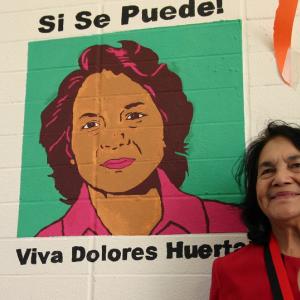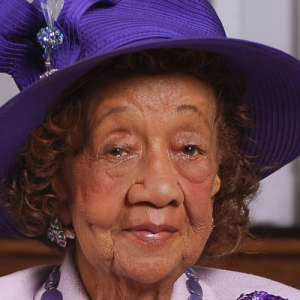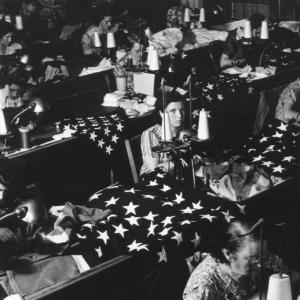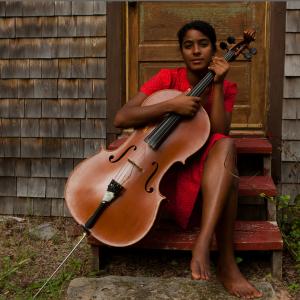
Jenna Barnett (@jennacbarnett) is the senior associate culture editor at Sojourners and the host of the audio limited series Lead Us Not. She was born in San Antonio and lives in San Diego. She has a B.A. in sociology and religion from Furman University and an M.F.A in Literary Reportage from New York University.
Before joining the Sojo team, Jenna managed the International Rescue Committee’s urban gardens in San Diego, and worked as a writer for the Women PeaceMakers Program at the Kroc Institute for Peace and Justice.
She has written for McSweeney’s, Texas Monthly, the Belladonna, and New York Magazine’s Grub Street. You’re likely to find her playing basketball, watching women’s soccer, eating homemade flour tortillas, or taking her time in Scrabble.
Some Sojourners articles by Jenna Barnett:
Culture:
Brandi Carlile’s Radical Gospel of Gentleness
“What I'm talking about is radical, filthy, trembling, scary, life-changing, beautiful forgiveness,” the Grammy-winner told Sojourners in an interview.
Snorting Nutmeg at Vacation Bible School with Lucy Dacus
Her album Home Video could have just as easily been named “Youth Group” or maybe “Adventures in Suburbia.”
Features:
How Do We Recover When Our Leaders Betray Us?
Charismatic leaders like Jean Vanier can inspire our faith — or make it fall apart.
Let There Be Light
When sexual abuse occurred in their church, Rev. Heidi Hankel and her congregation refused to let it stay hidden.
Humor:
Footprints in the Sand (Unedited)
Lord, when I needed you most, why were you snacking on Flamin' Hot Cheetos?
John the Baptist’s Recipe for Honey-Crisped Locusts
Once the locusts are as hot as a wealthy hypocrite burning in hell (about 200 degrees), add the honey.
Posts By This Author
Neither Angels Nor Demons
I CAN THINK OF MANY MISTAKES I made before turning 18, including a couple that could have landed me in juvenile detention: fireworks in the suburbs, running from the cops, lying to the cops about running from the cops, and one or two others I’ll keep to myself because everyone I interviewed for this story insists on this: Nobody is the worst thing they have ever done.
If those words are true, Sara Kruzan will not always be the 16-year-old who shot her sex trafficker in the head right after he took her to another hotel room.
And that means Krys Shelley is not just the 17-year-old who used an unloaded gun to rob someone.
But back when Shelley stood trial as a teen, the judge only saw a criminal. Shelley still remembers what the judge said before delivering the 12-year sentence: “Good luck.” He studied Shelley closely. “You’ll do just fine in there.”
Shelley believes that the judge felt like Shelley fit the bill of a juvenile delinquent—black, tall, and masculine. At the time, Shelley identified as a tomboy (today, Shelley is gender nonconforming). From an early age, Shelley could grow a full facial beard because of an inborn hormone imbalance—a common symptom of polycystic ovarian syndrome.
But it’s less about what the courts saw in Shelley, and more about what they didn’t see: an honor-roll student with a steady job whose pastor came to the courtroom to offer support.
Why Is the U.S. Handcuffing Incarcerated Women In Childbirth?

Image via Seth Drum/Flickr
The vast majority of incarcerated women have a history of trauma. According to the Court Services and Offender Supervision Agency, 75 percent of incarcerated women have suffered severe physical abuse by an intimate partner during adulthood, and 82 percent have endured serious physical or sexual abuse as children.
3 Ways the Senate Republicans’ Health Care Bill Targets Women
Thirteen male senators wrote a 142-page healthcare bill behind closed doors that puts the health of women in the U.S. in danger. While the authors of the “Better Care Reconciliation Act of 2017” may have forgotten about women — only including the words “women” and “woman” a few times in the whole document — Jesus never forgot about women’s health.
Let us not forget that healing was central to Jesus’ ministry, and the healing of afflicted women was just as important to him as the healing of men. Jesus healed a woman on the Sabbath in a room full of protesting men (Luke 13:10-17). Jesus healed a hemorrhaging woman considered ritually unclean who had been denied coverage — in a sense — for 12 years (Mark 5:25-34, Matthew 9:20-22, Luke 8:43-48).
Women Have to Work at Least 94 Extra Days to Earn What Men Do
For those who are counting, that’s 94 days. Ninety-four reminders of the stubbornly persistent — and plateauing — pay gap between men and women. According to the Labor Department’s Bureau of Labor Statistics, the average full-time working woman earns 20 percent less than the average full-time working man. The disparity grows starker for women of color: Black women make 37 percent less than men, and Latinas make 46 percent less. This disparity is wide enough to push some people to activism, and others to try to understand why this gap exists.
#WomenCrushWednesday: Margaret Bourke-White, the Woman Behind History’s Most Iconic Photos
Bourke-White traveled the world in search of complete stories: from Depression-era Hooverville to partitioning India to Apartheid-era South Africa to Nazi Germany. She became the first female war photojournalist and the first photographer for LIFE. After surviving a helicopter crash and getting stranded in the Arctic, Bourke-White’s colleagues declared her “Maggie the Indestructible.”
#WomenCrushWednesday: Dolores Huerta, ‘Dragon Lady’ of the Labor Movement

Image via Pitzer College/Flickr
In 1993, Huerta became the first Latina inducted into the National Women’s Hall of Fame. And in January, a documentary about her work, aptly titled Dolores, premiered at Sundance.
#WomenCrushWednesday: Lois Jenson, Iron Miner and the First Person to Win a Sexual Harassment Lawsuit in the U.S.
The fight to end sexual harassment and assault in the workplace continues. In 2016, the U.S. Equal Employment Opportunity Commission was asked to investigate 6,758 claims of sexual harassment — a number that has been steadily declining over the past several years (7,944 cases in 2010). Only about half of the claims result in charges. According to a Huffington Post YouGov poll, only 27 percent of the people who experienced sexual harassment reported the incident.
#WomenCrushWednesday: Dorothy Height, Godmother of the Civil Rights Movement

Dorothy Height, June 2008. Photo by Adrian Hood /CC BY-SA 4.0
Height is something of an unsung hero to both the civil rights and women’s rights movements, largely because of the sexism within the civil rights movement and the racism within the women rights movement. According to the New York Times, Height is “widely credited as the first person in the modern civil rights era to treat the problems of equality for women and equality for African-Americans as a seamless whole, merging concerns that had been largely historically separate.”
10 Women of Faith Leading the Charge Ahead
In honor of International Women’s Day, we asked some of our favorite women leaders questions about their personal hopes, faiths, fights for justice, and how their womanhood surrounds and informs those parts of them. Here is some of what they had to say.
#GrabYourHeadphones: 8 Songs by Powerful Women to Soundtrack Your Women’s Day

Image via Bruno Bollaert/Flickr
There are many ways you might spend International Women’s Day: going to work, staying at home, being a woman, or thanking a woman. This playlist is for all of these ways you’re observing the day, and more.
Hillary Clinton's Humans of New York Interview Resonates Because We've All Experienced That Moment
For Hillary Clinton, it was a classroom in Harvard with scared law school hopefuls trying to keep her from studying justice. For Malala Yousafzai it was a school bus loaded with an armed member of the Taliban, determined to keep her off her schoolyard soapbox. For me — clearly not saving the best for last here — it was a kitchen in the South with a confused freshman Baptist hell-bent on keeping me away from the pulpit.
Songs of Longing
LEYLA MCCALLA wrote the title track of her latest album A Day for the Hunter, A Day for the Prey while imagining the experience of the Haitian boat people—political asylum seekers who packed into sailboats headed for the U.S. only to get intercepted by the U.S. Coast Guard mid-journey and sent back to the politically volatile and violent land from which they fled. In the early 1990s, the U.S. repatriated more than 34,000 of these Haitians before hearing their asylum cases and listening to their stories.
McCalla sings their stories now—in French, Haitian Creole, and English. The album’s title is a Haitian proverb that McCalla came across in an excerpt of Gage Averill’s book of the same name: A Day for the Hunter, A Day for the Prey. McCalla explained to NPR that the phrase captures the spirit of her Haitian ancestors, who overcame slavery only to fall in and out of political turmoil, but that the proverb also points to a universal experience: “It made me think of the roles that we all play throughout our lifetimes, how we are all trying to navigate our way through this world where sometimes it feels as though we are the hunter, and sometimes we are the prey.”
McCalla can make us feel like we’ve gone back in time through songs written years ago about people fleeing another time’s violence. But McCalla’s voice also pushes us to consider today’s Syrian boat people, intercepted by white waters, delayed by white fear. And she urges us to consider this historically systemic turmoil alongside our own feelings of personal displacement and victory. The album’s inspiration is as timeless as McCalla’s voice.
Only three of the tracks on A Day for the Hunter are Leyla McCalla originals. All the others she arranges and bolsters with vocals from former Carolina Chocolate Drops band mate Rhiannon Giddens, the jazz guitar of Marc Ribot, and the fiddle of Louis Michot. McCalla incorporates the talents of all these musicians without crowding the sound of her songs. The instruments and voices almost take turns, giving A Day for the Hunter an uncluttered, focused, and conversational feel.
Recovering Joy in the Youth Sports Industry

Photo via Brocreative / Shutterstock.com
DAVID KING and Margot Starbuck are nostalgic for the good ol’ days of youth sports. In Overplayed: A Parent’s Guide to Sanity in the World of Youth Sports, the authors first critique the current youth sports machine by reminiscing about an athletic utopia of the past: One where kids used water bottles for goal posts and flip-flops for bases. Back when parents weren’t paying up to $18,000 in hotel and trainer fees for elite travel teams. Back when kids loved sports.
This book intends to teach parents how to prevent burnout, overuse injury, and a misguided value system for their children. However, I read Overplayed as a young single woman learning to love sports again after suffering overuse injury and burnout right before college. I wish my parents—loving and good-intentioned as they were and are—had read this book 20 years ago.
King, athletic director at a Mennonite university, and Starbuck, a writer and a parent to three teenage athletes, believe that sports has the potential to be a powerful force in the lives of children. However, often money and myths corrupt that potential. Early on, Starbuck speaks wonders of the ways athletics teach us to know and love our physicality, explaining, “I came to know my body as good because of the opportunities I had to play sports as a girl.” But with early single-sport specialization and year-round tournament schedules, children are coming to know their bodies as injured before they can come to know their bodies as good. The authors note that in 2014, 1.35 million kids suffered sports-related injuries that landed them in the emergency room. “‘No pain no gain,’” the authors insist, “should have no place in youth sports.”
Mary Oliver's Happiest Poems
I HAD GEARED myself up for a sort of Job-God exchange between Mary Oliver and some wild roses in the aptly named “Roses,” from her latest collection of poems, Felicity.
This is the scene: The narrator, full of poetic angst and existential fatalism, approaches some huddled roses and wonders in their direction: “What happens when the curtain goes / down and nothing stops it, not kissing, / not going to the mall, not the Super Bowl.”
I was ready for the roses to respond in a whirlwind full of rhetorical questions about the wonder and origin of creation. Instead they deflect the inquiry: “‘But as you can see, we are / just now entirely busy being roses.’”
And I laughed. In the past, Oliver’s poetry has caused me to cry over a dog (see “The First Time Percy Came Back”) and pray accidentally (see “The Summer Day”), but never before had her poems made me laugh.
In her 2014 collection Blue Horses, the flowers are “fragile blue.” They are “wrinkled and fading in the grass” until the next morning when somehow they crawl back up to the shrubs, bloom a bit, decide they want—just like all of us—“a little more of / life.” Now, in her latest collection of poetry, Oliver’s flowers are red, and they want as much life as they can get. They are carefree roses with a love of causal banter and a kind distaste for troubling existential questions.
How Not To Respond to Grief
All of us are understandably sad about Paris — devastated. Many people have used striped profile pictures, candles, and flowers to express our collective solidarity. But in the wake of tragedy, almost half of the governors of the U.S. have responded with fear, announcing that they will do whatever they can to thwart the acceptance of Syrian refugees — from cutting funding for nonprofit resettlement agencies, to demanding religious screening tests.
If there’s one thing I learned from some of my friends who are refugees, it’s how to respond to grief. And there’s no one approach and they didn’t always get it right. But sometimes they did: Some refugees, in the shadow of shocking sadness, sang more than usual, prayed louder, invited more friends over for dinner, cooked their parent’s recipes. None of them responded with terrorism.
A Behind-the-Scenes Look at Faith in Ferguson
Young people ignited by injustice, refusing to back down. A nation waking up to the reality of racial disparities. And a church that can no longer remain silent. This, says Eden Theological Seminary professor Leah Francis Gunning, is the real “Ferguson Effect.” As she protested in Ferguson over the past year, Gunning collected interviews from clergy and young organizers. The result is Ferguson and Faith: Sparking Leadership & Awakening Community (Chalice Press, 2015), a behind-the-scenes look at the role of the church in the Black Lives Matter movement. Sojourners interviewed Francis to learn more about the religious community’s role in supporting and sustaining a racial justice movement started by young activists.
The Devil We Know

Image via sakkmesterke/Shutterstock.
As a ten-year-old suburbanite, I saw a black dog stumble through the cul-de-sac without a collar and named him “The Devil.”
I remember a couple years later deciding I was wrong — that the devil was bearded, gendered, nocturnal, and afraid of my prayers.
I think about the devil differently now. I think less about bearded imps and more about the incarnations of evil I see around me: racist shootings, the disrespected bodies of women, dusty nukes.
The devil has evolved and morphed throughout Judeo-Christian history as well, going from absent, to messenger, to adversary, to the evil commander in an eschatological battle, to metaphor, to the Broadway sock puppet described in Stephanie Sandberg’s “Devils We Know” (Sojourners, July 2015). In many ways, the devil’s role in scripture is as changing and fascinating as the devil’s role in pop culture.
Athletic Feminism and the Women’s World Cup
Feminism and athleticism were one in the same to me. Four square matches, pick-up basketball games, and soccer scrimmages were all opportunities to prove that women were as valuable and gifted as men. Brandi Chastain with her shirt off and body flexed in uninhibited celebration was my Betty Friedan and my Bell Hooks.
But then puberty arrived, and brought with it hormones, testosterone, and different images of female athletes as the boys in my classes got their hands on the Sports Illustrated swimsuit edition (I’m a much bigger fan of the feminine strength displayed in ESPN’s “The Body Issue”). The Women's United Soccer Association — the world’s first paid professional women’s soccer league — closed down, and suddenly it seemed to me that the U.S. only cared about women’s sports when women traded in their sports bras for bikinis.
So when I read that this U.S. Women’s World Cup brought in 285 percent more viewers in its group stage play than ever before, and when I heard two twenty-year-old men at a jam-packed bar in D.C. rattle off statistics about Morgan Brian’s college scoring stats and Tobin Heath’s signature moves, I got excited.
L'Arche: 50 Years of Transforming Communities
Krista Tippett, host of the successful podcast On Being, is one of those transformed people. She described to Sojourners how her radio pilgrimage to an Iowa L’Arche community and an interview with L’Arche founder and Templeton Prize winner Jean Vanier influenced her way of thinking about Christianity:
“What I love about L’Arche is that it is a living manifestation of some of the most paradoxical and lofty ideals of Christianity — strength and weakness, light and darkness — that our culture and some of our churches can barely grasp. It’s very countercultural, very paradoxical. But it’s embodied at L’Arche—lived and breathed in an everyday way.”
After a flower procession and a dramatization of the origin story of L’Arche, Tippett joined in on the 50th-anniversary celebrations by publicly interviewing four L’Arche community members.
'This Is My Iran'
A middle-aged Iranian man sat down next to me at Shirin Neshat’s new retrospective, "Facing History," in Washington, D.C. He looked at me, smiling and bewildered, and said, “All of this, this whole museum, just for her?”
He wasn’t the only one surprised. In Neshat’s opening comments to a packed house at a meet-the-artist presentation, she said, “It’s an honor as a woman and as a Middle Easterner to hold this much space.”
And she didn’t just take up space. She filled it — covered the entire second floor of the Hirshhorn Museum of Modern Art with Muslim women, Iranian history, Persian music, and creative commentary on the role of gender and politics on the life of a woman in exile.












